文言文名言的英语翻译
- 格式:doc
- 大小:31.00 KB
- 文档页数:5
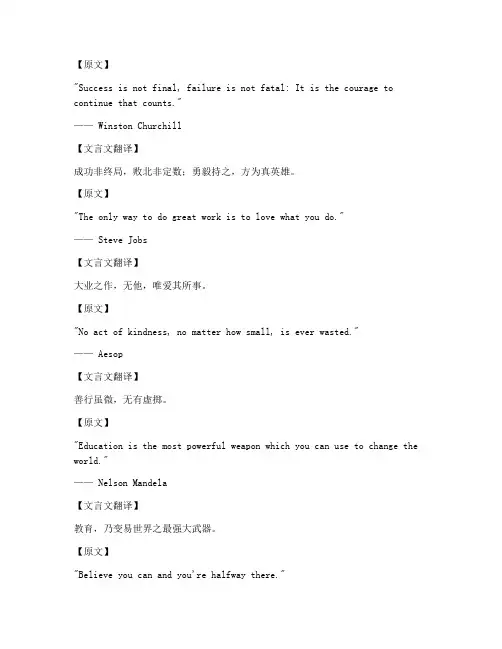
【原文】"Success is not final, failure is not fatal: It is the courage to continue that counts."—— Winston Churchill【文言文翻译】成功非终局,败北非定数;勇毅持之,方为真英雄。
【原文】"The only way to do great work is to love what you do."—— Steve Jobs【文言文翻译】大业之作,无他,唯爱其所事。
【原文】"No act of kindness, no matter how small, is ever wasted."—— Aesop【文言文翻译】善行虽微,无有虚掷。
【原文】"Education is the most powerful weapon which you can use to change the world."—— Nelson Mandela【文言文翻译】教育,乃变易世界之最强大武器。
【原文】"Believe you can and you're halfway there."—— Theodore Roosevelt【文言文翻译】信之,则成功之半。
【原文】"Life is like a camera. Just focus on what's important and capture the good times, develop from the negatives and if things don't work out, just take another shot."—— Unknown【文言文翻译】人生如摄影,唯聚焦于重要之事,捕捉美好时光;遇逆境,如负片,亦当琢磨;若事不成,再拍一照。
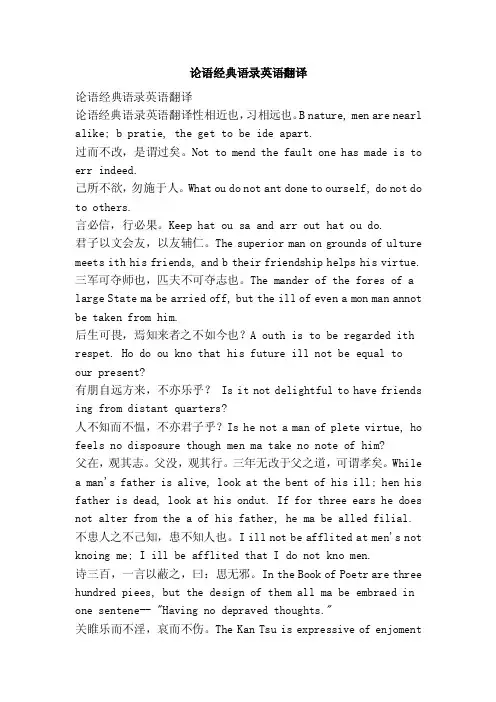
论语经典语录英语翻译论语经典语录英语翻译论语经典语录英语翻译性相近也,习相远也。
B natur e, men a re nearl alike;b pratie, the ge t to beide apar t.过而不改,是谓过矣。
Not to mend the fau lt one h as madeis to er r indeed.己所不欲,勿施于人。
What ou do n ot ant d one to o urself,do not d o to oth ers.言必信,行必果。
Kee p hat ou sa andarr outhat ou d o.君子以文会友,以友辅仁。
T he super ior manon groun ds of ul ture mee ts ith h is frien ds, andb theirfriendsh ip helps his vir tue. 三军可夺师也,匹夫不可夺志也。
Themander o f the fo res of a large S tate mabe arrie d off, b ut the i ll of ev en a mon man ann ot be ta ken from him.后生可畏,焉知来者之不如今也?A o uth is t o be reg arded it h respet. Ho doou kno t hat hisfuture i ll not b e equalto our p resent?有朋自远方来,不亦乐乎? Isit not d elightfu l to hav e friend s ing fr om dista nt quart ers?人不知而不愠,不亦君子乎?Is henot a ma n of ple te virtu e, ho fe els no d isposure thoughmen ma t ake no n ote of h im?父在,观其志。
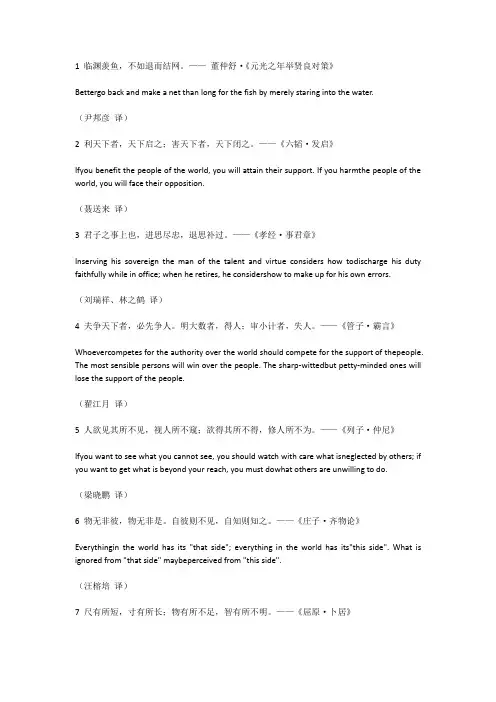
1 临渊羡鱼,不如退而结网。
——董仲舒·《元光之年举贤良对策》Bettergo back and make a net than long for the fish by merely staring into the water.(尹邦彦译)2 利天下者,天下启之;害天下者,天下闭之。
——《六韬·发启》Ifyou benefit the people of the world, you will attain their support. If you harmthe people of the world, you will face their opposition.(聂送来译)3 君子之事上也,进思尽忠,退思补过。
——《孝经·事君章》Inserving his sovereign the man of the talent and virtue considers how todischarge his duty faithfully while in office; when he retires, he considershow to make up for his own errors.(刘瑞祥、林之鹤译)4 夫争天下者,必先争人。
明大数者,得人;审小计者,失人。
——《管子·霸言》Whoevercompetes for the authority over the world should compete for the support of thepeople. The most sensible persons will win over the people. The sharp-wittedbut petty-minded ones will lose the support of the people.(翟江月译)5 人欲见其所不见,视人所不窥;欲得其所不得,修人所不为。
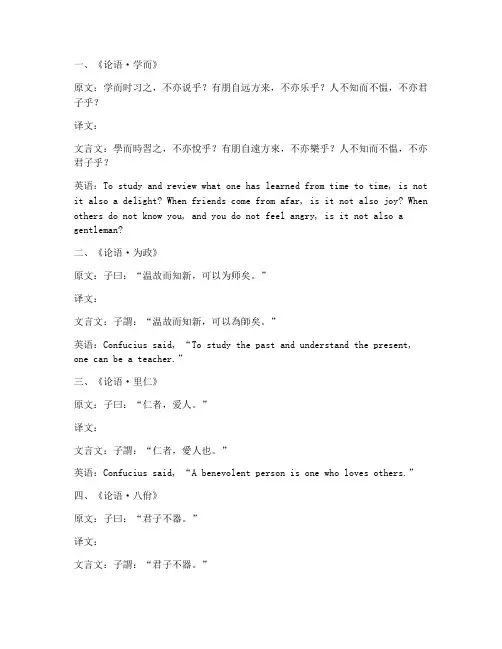
一、《论语·学而》原文:学而时习之,不亦说乎?有朋自远方来,不亦乐乎?人不知而不愠,不亦君子乎?译文:文言文:學而時習之,不亦悅乎?有朋自遠方來,不亦樂乎?人不知而不愠,不亦君子乎?英语:To study and review what one has learned from time to time, is not it also a delight? When friends come from afar, is it not also joy? When others do not know you, and you do not feel angry, is it not also a gentleman?二、《论语·为政》原文:子曰:“温故而知新,可以为师矣。
”译文:文言文:子謂:“温故而知新,可以為師矣。
”英语:Confucius said, “To study the past and understand the present, one can be a teacher.”三、《论语·里仁》原文:子曰:“仁者,爱人。
”译文:文言文:子謂:“仁者,愛人也。
”英语:Confucius said, “A benevolent person is one who loves others.”四、《论语·八佾》原文:子曰:“君子不器。
”译文:文言文:子謂:“君子不器。
”英语:Confucius said, “A gentleman is not a tool.”五、《论语·述而》原文:子曰:“三人行,必有我师焉。
择其善者而从之,其不善者而改之。
”译文:文言文:子謂:“三人行,必有我師焉。
選其善者而從之,其不善者而改之。
”英语:Confucius said, “Among three people walking together, there must be someone I can learn from. I will follow the good ones and correct the bad ones.”六、《论语·泰伯》原文:曾子曰:“君子以文会友,以友辅仁。
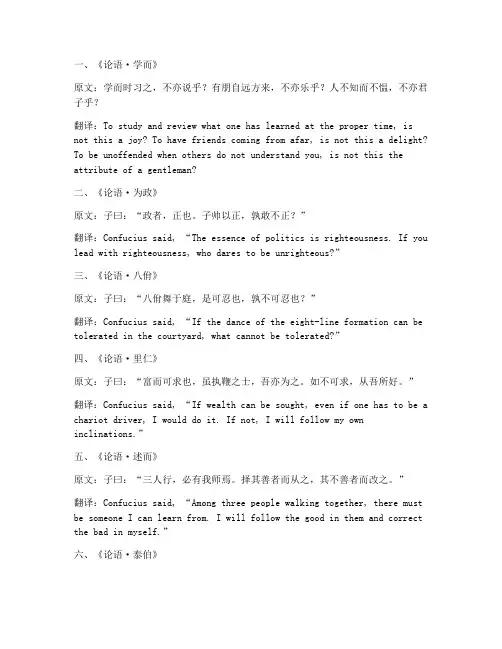
一、《论语·学而》原文:学而时习之,不亦说乎?有朋自远方来,不亦乐乎?人不知而不愠,不亦君子乎?翻译:To study and review what one has learned at the proper time, is not this a joy? To have friends coming from afar, is not this a delight? To be unoffended when others do not understand you, is not this the attribute of a gentleman?二、《论语·为政》原文:子曰:“政者,正也。
子帅以正,孰敢不正?”翻译:Confucius said, “The essence of politics is righteousness. If you lead with righteousness, who dares to be unrighteous?”三、《论语·八佾》原文:子曰:“八佾舞于庭,是可忍也,孰不可忍也?”翻译:Confucius said, “If the danc e of the eight-line formation can be tolerated in the courtyard, what cannot be tolerated?”四、《论语·里仁》原文:子曰:“富而可求也,虽执鞭之士,吾亦为之。
如不可求,从吾所好。
”翻译:Confucius said, “If wealth can be sought, even if one has to be a chariot driver, I would do it. If not, I will follow my own inclinations.”五、《论语·述而》原文:子曰:“三人行,必有我师焉。
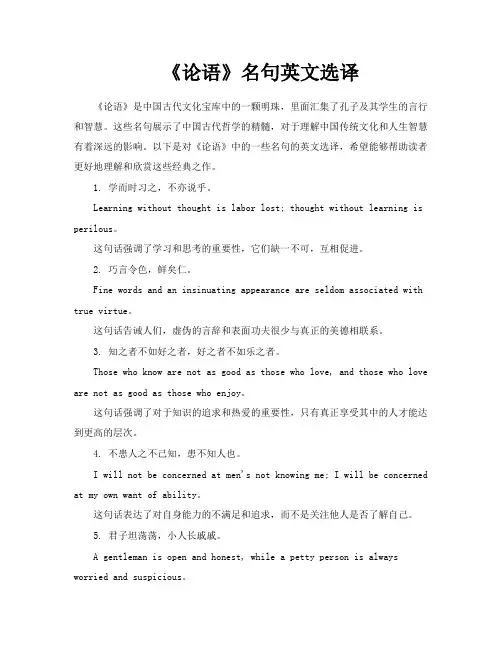
《论语》名句英文选译《论语》是中国古代文化宝库中的一颗明珠,里面汇集了孔子及其学生的言行和智慧。
这些名句展示了中国古代哲学的精髓,对于理解中国传统文化和人生智慧有着深远的影响。
以下是对《论语》中的一些名句的英文选译,希望能够帮助读者更好地理解和欣赏这些经典之作。
1. 学而时习之,不亦说乎。
Learning without thought is labor lost; thought without learning is perilous。
这句话强调了学习和思考的重要性,它们缺一不可,互相促进。
2. 巧言令色,鲜矣仁。
Fine words and an insinuating appearance are seldom associated with true virtue。
这句话告诫人们,虚伪的言辞和表面功夫很少与真正的美德相联系。
3. 知之者不如好之者,好之者不如乐之者。
Those who know are not as good as those who love, and those who love are not as good as those who enjoy。
这句话强调了对于知识的追求和热爱的重要性,只有真正享受其中的人才能达到更高的层次。
4. 不患人之不己知,患不知人也。
I will not be concerned at men's not knowing me; I will be concerned at my own want of ability。
这句话表达了对自身能力的不满足和追求,而不是关注他人是否了解自己。
5. 君子坦荡荡,小人长戚戚。
A gentleman is open and honest, while a petty person is always worried and suspicious。
这句话强调了君子的坦诚和小人的猜疑心态之间的区别。
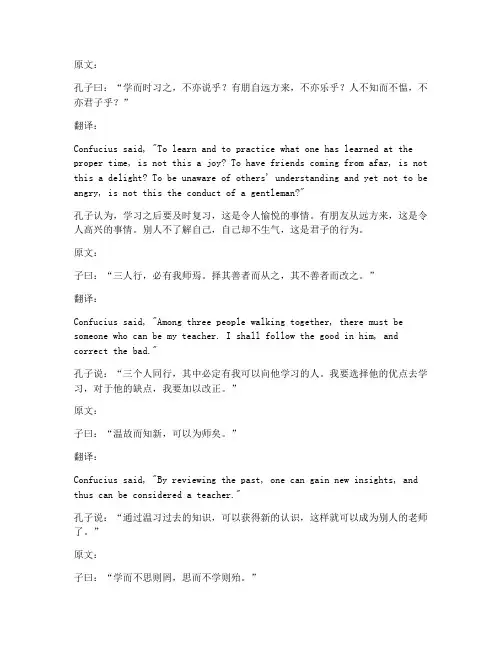
孔子曰:“学而时习之,不亦说乎?有朋自远方来,不亦乐乎?人不知而不愠,不亦君子乎?”翻译:Confucius said, "To learn and to practice what one has learned at the proper time, is not this a joy? To have friends coming from afar, is not this a delight? To be unaware of others' understanding and yet not to be angry, is not this the conduct of a gentleman?"孔子认为,学习之后要及时复习,这是令人愉悦的事情。
有朋友从远方来,这是令人高兴的事情。
别人不了解自己,自己却不生气,这是君子的行为。
原文:子曰:“三人行,必有我师焉。
择其善者而从之,其不善者而改之。
”翻译:Confucius said, "Among three people walking together, there must be someone who can be my teacher. I shall follow the good in him, and correct the bad."孔子说:“三个人同行,其中必定有我可以向他学习的人。
我要选择他的优点去学习,对于他的缺点,我要加以改正。
”原文:子曰:“温故而知新,可以为师矣。
”翻译:Confucius said, "By reviewing the past, one can gain new insights, and thus can be considered a teacher."孔子说:“通过温习过去的知识,可以获得新的认识,这样就可以成为别人的老师了。
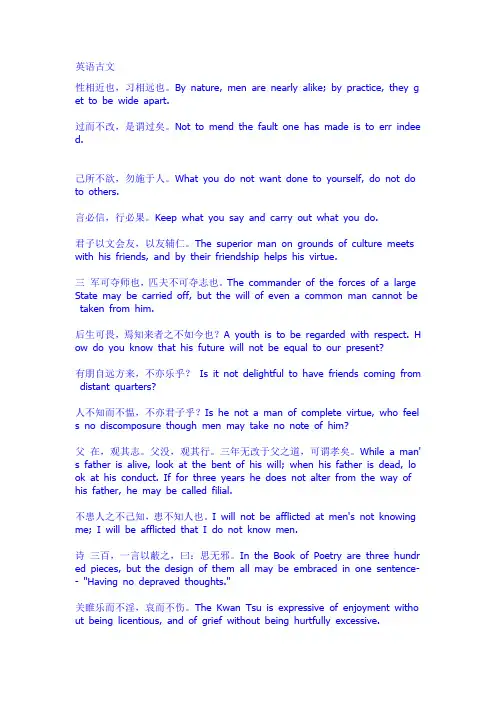
英语古文性相近也,习相远也。
By nature, men are nearly alike; by practice, they g et to be wide apart.过而不改,是谓过矣。
Not to mend the fault one has made is to err indee d.己所不欲,勿施于人。
What you do not want done to yourself, do not do to others.言必信,行必果。
Keep what you say and carry out what you do.君子以文会友,以友辅仁。
The superior man on grounds of culture meets with his friends, and by their friendship helps his virtue.三军可夺师也,匹夫不可夺志也。
The commander of the forces of a large State may be carried off, but the will of even a common man cannot be taken from him.后生可畏,焉知来者之不如今也?A youth is to be regarded with respect. H ow do you know that his future will not be equal to our present?有朋自远方来,不亦乐乎?Is it not delightful to have friends coming from distant quarters?人不知而不愠,不亦君子乎?Is he not a man of complete virtue, who feel s no discomposure though men may take no note of him?父在,观其志。
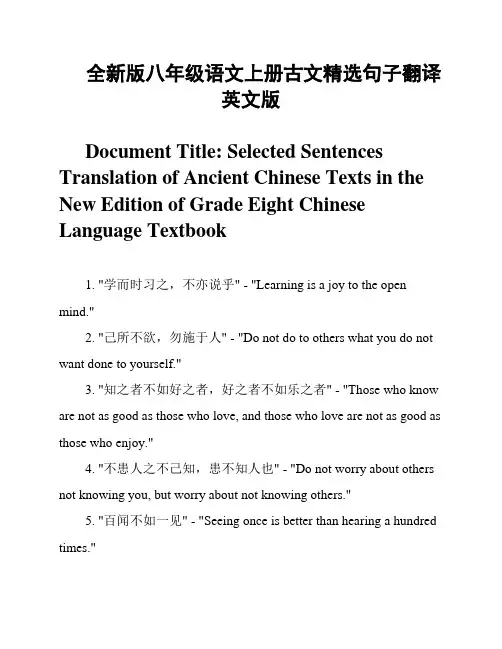
全新版八年级语文上册古文精选句子翻译英文版Document Title: Selected Sentences Translation of Ancient Chinese Texts in the New Edition of Grade Eight Chinese Language Textbook1. "学而时习之,不亦说乎" - "Learning is a joy to the open mind."2. "己所不欲,勿施于人" - "Do not do to others what you do not want done to yourself."3. "知之者不如好之者,好之者不如乐之者" - "Those who know are not as good as those who love, and those who love are not as good as those who enjoy."4. "不患人之不己知,患不知人也" - "Do not worry about others not knowing you, but worry about not knowing others."5. "百闻不如一见" - "Seeing once is better than hearing a hundred times."6. "不畏浮云遮望眼" - "Do not fear the clouds that block your vision."7. "人无远虑,必有近忧" - "Without farsightedness, there will be immediate worries."9. "欲穷千里目,更上一层楼" - "To see a thousand miles, climb one more level."10. "读书破万卷,下笔如有神" - "Reading ten thousand books makes writing as if inspired by a god."。
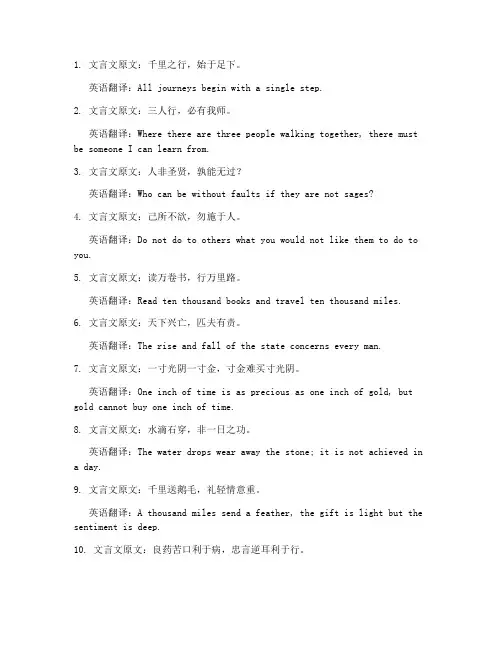
1. 文言文原文:千里之行,始于足下。
英语翻译:All journeys begin with a single step.2. 文言文原文:三人行,必有我师。
英语翻译:Where there are three people walking together, there must be someone I can learn from.3. 文言文原文:人非圣贤,孰能无过?英语翻译:Who can be without faults if they are not sages?4. 文言文原文:己所不欲,勿施于人。
英语翻译:Do not do to others what you would not like them to do to you.5. 文言文原文:读万卷书,行万里路。
英语翻译:Read ten thousand books and travel ten thousand miles.6. 文言文原文:天下兴亡,匹夫有责。
英语翻译:The rise and fall of the state concerns every man.7. 文言文原文:一寸光阴一寸金,寸金难买寸光阴。
英语翻译:One inch of time is as precious as one inch of gold, but gold cannot buy one inch of time.8. 文言文原文:水滴石穿,非一日之功。
英语翻译:The water drops wear away the stone; it is not achieved in a day.9. 文言文原文:千里送鹅毛,礼轻情意重。
英语翻译:A thousand miles send a feather, the gift is light but the sentiment is deep.10. 文言文原文:良药苦口利于病,忠言逆耳利于行。
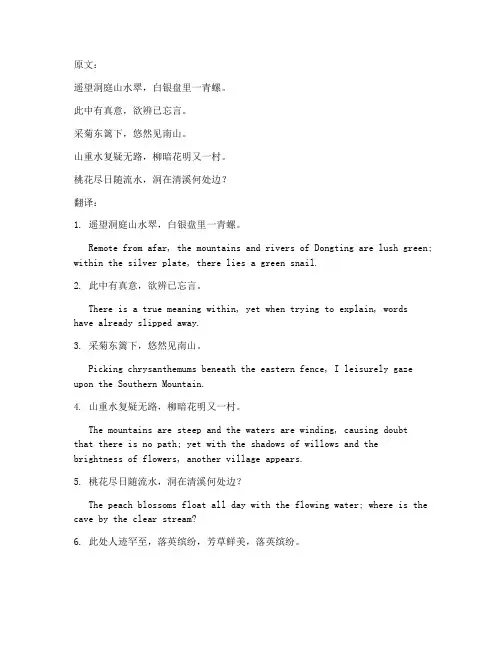
原文:遥望洞庭山水翠,白银盘里一青螺。
此中有真意,欲辨已忘言。
采菊东篱下,悠然见南山。
山重水复疑无路,柳暗花明又一村。
桃花尽日随流水,洞在清溪何处边?翻译:1. 遥望洞庭山水翠,白银盘里一青螺。
Remote from afar, the mountains and rivers of Dongting are lush green; within the silver plate, there lies a green snail.2. 此中有真意,欲辨已忘言。
There is a true meaning within, yet when trying to explain, words have already slipped away.3. 采菊东篱下,悠然见南山。
Picking chrysanthemums beneath the eastern fence, I leisurely gaze upon the Southern Mountain.4. 山重水复疑无路,柳暗花明又一村。
The mountains are steep and the waters are winding, causing doubtthat there is no path; yet with the shadows of willows and thebrightness of flowers, another village appears.5. 桃花尽日随流水,洞在清溪何处边?The peach blossoms float all day with the flowing water; where is the cave by the clear stream?6. 此处人迹罕至,落英缤纷,芳草鲜美,落英缤纷。
Here, the footprints of people are rare, the fallen petals are scattered, the grass is lush and fresh, and the petals are falling in profusion.7. 隐逸之士,避世而居,不知有汉,无论魏晋。
人生如梦,转眼百年。
世间万物,瞬息万变。
君子之道,静以修身,俭以养德。
非淡泊无以明志,非宁静无以致远。
立志高远,脚踏实地。
逆境中求成长,顺境中思进取。
善莫大焉,德莫厚焉。
知足常乐,知止常安。
自强不息,厚德载物。
译文(英语):Life is like a dream, fleeting through a century. All things in the world change in the twinkling of an eye. The path of the gentleman is to cultivate oneself in tranquility, and to nurture virtue through frugality. Without dispassion, one cannot clarify one's aspirations; without tranquility, one cannot achieve the distant. Set high ambitions and tread firmly on the ground. Seek growth in adversity and strive for progress in prosperity. The greatest of virtues, the deepest of virtues. Contentment with what one has is the way to lasting happiness, and knowing when to stop is the key to constant peace. Persevere in self-improvement, and bear great virtues.In the fleeting span of a human life, it seems as though we traverse a dream, a century passing in a blink. The world and its myriad of things are ever-changing, a constant flux. The way of the gentleman is torefine oneself in quietude, and to foster virtue through simplicity and thrift. Without a lack of desire, one cannot discern one's true aspirations; without tranquility, one cannot attain distant goals. To set ambitious goals and to walk firmly on the path of life. To grow through adversity and to think of advancing in prosperity. There is no greater virtue than that, no thicker virtue than that.To be content with what one has is the path to enduring joy, and to know when to stop is the key to constant peace. To never cease in self-improvement and to bear the weight of great virtues. This is the essence of a life well-lived, a journey marked by integrity and unwavering determination.。
原文:子曰:“学而时习之,不亦说乎?有朋自远方来,不亦乐乎?人不知而不愠,不亦君子乎?”译文:The Master said, "Is it not pleasant to learn and to practice what one has learned at the proper time? Is it not delightful to have friends coming from distant places? Is it not a virtue for a man to bear others' ignorance without being resentful?"解析:这段话出自《论语》的第一篇《学而》,是孔子对学习的态度和君子品质的阐述。
“学而时习之,不亦说乎?”这句话表达了孔子对学习的重视。
他认为学习不仅仅是获取知识,更重要的是将所学应用于实践。
只有将知识与实践相结合,才能真正掌握所学。
这里的“时习”指的是适时地复习和巩固所学的知识。
“有朋自远方来,不亦乐乎?”这句话体现了孔子对友谊的珍视。
他认为,真正的朋友不在于距离的远近,而在于心灵的相通。
当远方的朋友来访时,能够感受到他们的真诚和关心,这是人生的一大乐事。
“人不知而不愠,不亦君子乎?”这句话阐述了孔子对君子品质的理解。
他认为,一个真正的君子在面对他人的无知和误解时,能够保持平和的心态,不生气、不怨恨。
这种宽容和包容的品质,正是君子之所以为君子的原因。
英文翻译:The Master said, "Is it not pleasant to learn and to practice what one has learned at the proper time? Is it not delightful to have friends coming from distant places? Is it not a virtue for a man to bear others' ignorance without being resentful?"This passage from the first chapter of the Analects reflects Confucius' attitude towards learning and the virtues of a gentleman."To learn and to practice what one has learned at the proper time, is it not pleasant?" This sentence emphasizes Confucius' importance of learning. He believed that learning is not only about acquiring knowledge but also about applying it in practice. Only by combining knowledge with practice can one truly master what has been learned. The phrase "to practice at the proper time" refers to reviewing and consolidating the knowledge learned at the right moment."To have friends coming from distant places, is it not delightful?" This sentence reflects Confucius' appreciation for friendship. He believed that true friends are not defined by distance but by the connection of their hearts. When friends from afar visit, one can feel their sincerity and concern, which is a great joy in life."To bear others' ignorance without being resentful, is it not a virtue for a gentleman?" This sentence elaborates on Confucius' understanding of a gentleman's character. He believed that a true gentleman can maintain a peaceful demeanor when facing others' ignorance and misunderstandings, without being angry or resentful. This virtue of tolerance and包容 is what makes a gentleman a gentleman.。
《论语·颜渊》曰:“己所不欲,勿施于人;己所欲,亦勿施于人。
赐也,何如?”子曰:“夫仁者,己欲立而立人,己欲达而达人。
能近取譬,可谓仁之方也已。
”译文:In the "Analects" of Confucius, it is said: "Do not do to others whatyou would not like done to yourself; and also, do not impose on others what you would not wish to be imposed on you. What do you think, Zishan?" Confucius replied: "A benevolent person seeks to establish himself so that he can also help others to establish themselves; to achieve his own success so that he can also help others to succeed. If one can draw an analogy from what is close at hand, he may be said to be on the right path to benevolence."English Translation:In the "Yan Hua" chapter of the "Analects," it is recorded: "Do not doto others what you would not wish done to yourself; nor should you impose on others what you would not wish to be imposed upon. What isyour opinion, Zishan?" Confucius answered: "The benevolent person seeks to establish himself in order to assist others in their establishment;to achieve his own success so that he can also facilitate the success of others. If one can draw an apt analogy from the familiar, he may be considered to be on the correct path towards benevolence."This passage from the "Analects" encapsulates the principle ofreciprocity and the essence of benevolence, which are central tenets of Confucian philosophy. The dialogue between Confucius and his disciple Zishan highlights the importance of self-reflection and empathy in the practice of virtue.In the first part of the quote, Confucius advises against imposing on others what one would not want for oneself. This principle is auniversal ethical guideline, urging individuals to consider the welfare of others in their actions. It is a call to moral responsibility andself-awareness, reminding us that our actions have consequences beyond ourselves.The second part of the quote delves into the concept of benevolence, or "ren" in Chinese. Confucius describes the benevolent person as one who seeks not only his own success but also the success of others. This idea is profound, as it emphasizes the interconnectedness of human beings and the importance of altruism. The benevolent person is not merely concerned with personal gain but is motivated by a desire to contribute to the well-being of the community.Confucius further illustrates the path to benevolence by suggesting the use of analogy. By drawing parallels between one's own experiences and the experiences of others, one can better understand the needs and desires of others. This approach encourages empathy and fosters a deeper connection between individuals, leading to a more harmonious and compassionate society.The English translation of this passage aims to convey the wisdom and depth of the original text. It seeks to capture the essence of Confucian philosophy and present it in a way that is accessible to English-speaking audiences. The translation aims to preserve the original meaning while adapting the language to suit the contemporary reader.In conclusion, the passage from the "Analects" offers a timeless message about the importance of ethical conduct and the cultivation of benevolence. It serves as a reminder that our actions have the power to impact not only ourselves but also those around us. By practicing empathy, self-reflection, and the principle of reciprocity, we can contribute to a more harmonious and compassionate world.。
---Original Text (Classical Chinese):天地之大德曰生,圣人之道曰仁。
仁者,爱也;爱者,恒也。
恒者,久也。
久者,德之固也。
故圣人之道,所以立天下也。
天地之大德,所以育万物也。
吾观自古圣贤,莫不宗此道。
孔子曰:“己所不欲,勿施于人。
”孟子曰:“仁者爱人。
”老子曰:“上善若水。
”庄子曰:“逍遥游。
”此皆圣人之言,皆出于仁。
仁者,非独爱其亲,亦爱人之亲;非独敬其兄,亦敬人之兄。
是以天下莫不亲其亲,莫不敬其兄。
此仁之至也。
夫仁者,所以成己也,所以成物也。
天地之间,莫贵于仁。
仁者,所以养心也。
养心者,所以养德也。
养德者,所以养寿也。
养寿者,所以养志也。
志士仁人,无求生以害仁,有杀身以成仁。
吾尝思之,仁者之所以能久立于世,以其心无私欲也。
无私欲则无私忧,无私忧则无惧,无惧则无惑。
是以能大行其道,而无所阻。
今之人,多欲而寡德,故常为患害。
欲者,所以伤德也。
德者,所以养身也。
身者,所以载德也。
德者,所以载道也。
道者,所以载天也。
天者,所以载万物也。
夫仁者,天地之心也。
天地之心,所以育万物也。
万物皆得其所,则各遂其生。
各遂其生,则各安其性。
各安其性,则各尽其职。
各尽其职,则各得其所。
此天地之大德,所以能久立而不败也。
译文 (English):The great virtue of heaven and earth is to give life, and the way of the sage is to be benevolent. Benevolence is love; love is constant; constancy is enduring; and enduring is the firmness of virtue. Therefore, the way of the sage is the foundation of the world, and the great virtue of heaven and earth is the nurturing of all things.I have observed that all ancient sages have followed this way. Confucius said, "Do not do to others what you would not want done to yourself." Mencius said, "The benevolent love others." Laozi said, "The highest good is like water." Zhuangzi said, "Enjoy a journey of solitude." All these are the words of the sages, all emanating from benevolence.Benevolence is not only the love for one's own family, but also the love for the families of others; not only the respect for one's own brother, but also the respect for the brothers of others. Therefore, no one is not loving their own family, and no one is not respecting their own brother. This is the ultimate of benevolence. Benevolence is the way to cultivate oneself, and the way to cultivate all things.Between heaven and earth, nothing is more precious than benevolence. Benevolence is the way to nourish the heart; to nourish the heart is to nourish virtue; to nourish virtue is to nourish longevity; to nourish longevity is to nourish one's aspirations. The noble and benevolent do not seek to live at the expense of benevolence, but are willing to sacrifice their lives to achieve it.I have often thought about it, and the reason why benevolent people can。
原文:学而时习之,不亦说乎?有朋自远方来,不亦乐乎?人不知而不愠,不亦君子乎?现代汉语:学习并且时常温习,不是也很愉快吗?有朋友从远方来,不是也很快乐吗?别人不了解我,我不生气,不是也很像君子吗?英语翻译:To learn and to review it regularly, is it not joyous?When friends come from afar, is it not delightful?When others do not understand me and I do not feel resentment, is it not the manner of a gentleman?进一步翻译如下:原文:学而时习之,不亦说乎?Translation:To study and to practice what has been learned at the proper time, is it not a source of joy?有朋自远方来,不亦乐乎?Translation:When friends arrive from a distant land, is it not a cause for joy?人不知而不愠,不亦君子乎?Translation:When others are unaware and do not harbor resentment, is not such a person truly a gentleman?原文:温故而知新,可以为师矣。
Translation:By reviewing what is known and gaining new insights, one can be considered a teacher.发愤忘食,乐以忘忧,不知老之将至云尔。
Translation:Determined to study so intensely that one forgets to eat, and finding joy in it so as to forget one's worries, one does not even realize that old age is approaching.举一反三,触类旁通。
古代有句名言英文以下是一些古代的名言及其英文翻译:1. 知之为知之,不知为不知,是知也。
——《论语》"To know what you know and what you do not know is wisdom." - The Analects2. 学而不思则罔,思而不学则殆。
——《论语》"Learning without thinking leads to confusion; thinking without learning leads to danger." - The Analects3. 三人行,必有我师焉。
择其善者而从之,其不善者而改之。
——《论语》"When three people walk together, there must be one who can be my teacher. I will choose the good qualities of that person to follow, and the bad qualities to avoid." - The Analects4. 己所不欲,勿施于人。
——《论语》"Do not do to others what you do not want others to do to you." - The Analects5. 工欲善其事,必先利其器。
——《论语》"If a worker wants to do a good job, he must first sharpen his tools." - The Analects6. 天时不如地利,地利不如人和。
——《孟子》"Opportunities vouchsafed by Heaven are less important than terrestrial advantages, which in turn are less important than the unity among people." - Mencius7. 富贵不能淫,贫贱不能移,威武不能屈。
作为一部优秀的语录体散文集,《论语》以言简意赅、含蓄隽永的语言,记述了孔子的言论。
《论语》中所记孔子循循善诱的教诲之言,或简单应答,点到即止;或启发论辩,侃侃而谈;富于变化,娓娓动人。
以下是《论语十则》的翻译。
子曰:「学而时习之,不亦说乎。
有朋自远方来,不亦乐乎。
人不知而不愠,不亦君子乎。
」Confucius said: "Isn’t it a pleasure to study and practice what you have learned? Isn’t it also great when friends visit from distant places? If people do not recognize me and it doesn’t bother me, am I not a Superior Man?"子曰:「不患人之不己知,患不知人也。
」Confucius said: "I am not bothered by the fact that I am unknown. I am bothered when I do not know others."子曰:「道之以政,齐之以刑,民免而无耻;道之以德,齐之以礼,有耻且格。
」Confucius said: "If you govern the people legalistically and control them by punishment, they will avoid crime, but have no personal sense of shame. If you govern them by means of virtue and control them with propriety, they will gain their own sense of shame, and thus correct themselves."子曰:「吾十有五而志于学,三十而立,四十而不惑,五十而知天命,六十而耳顺,七十而从心所欲,不逾矩。
」Confucius said: "At fifteen my heart was set on learning; at thirty I stood firm; at forty I had no more doubts; at fifty I knew the mandate of heaven; at sixty my ear was obedient; at seventy I could follow my heart’s desire without transgressing the norm."子曰:「温故而知新,可以为师矣。
」Confucius said: "Reviewing what you have learned and learning anew, you are fit to be a teacher."子曰:「君子不器。
」Confucius said: "The Superior Man is no utensil."子贡问君子。
子曰:「先行其言而后从之。
」Tzu Kung asked about the character of the Superior Man. Confucius said, "First he practices what he preaches and then he follows it."子曰:「学而不思则罔,思而不学则殆。
」Confucius said: "To study and not think is a waste. To think and not study is dangerous."子曰:「由、诲女知之乎。
知之为知之,不知为不知,是知也。
」Confucius said: "Yu, shall I teach you about knowledge? What you know, you know, what you don’t know, you don’t know. This is knowledge."子曰:「人而不仁,如礼何?人而不仁,如乐何?」Confucius said: "If a man has no humaneness what can his propriety be like? If a man has no humaneness what can his music be like?"【其他一些有名的文言文英文翻译。
】1临渊羡鱼,不如退而结网。
——董仲舒·《元光之年举贤良对策》Better go back and make a net than long for the fish by merely staring into the water.2利天下者,天下启之;害天下者,天下闭之。
——《六韬·发启》If you benefit the people of the world, you will attain their support. If you harm the people of the world, you will face their opposition.3 君子之事上也,进思尽忠,退思补过。
——《孝经·事君章》In serving his sovereign the man of the talent and virtue considers how to discharge his duty faithfully while in office; when he retires, he considers how to make up for his own errors.4 夫争天下者,必先争人。
明大数者,得人;审小计者,失人。
——《管子·霸言》Whoever competes for the authority over the world should compete for the support of the people. The most sensible persons will win over the people. Thesharp-witted but petty-minded ones will lose the support of the people.5 人欲见其所不见,视人所不窥;欲得其所不得,修人所不为。
——《列子·仲尼》If you want to see what you cannot see, you should watch with care what is neglected by others; if you want to get what is beyond your reach, you must do what others are unwilling to do.6 物无非彼,物无非是。
自彼则不见,自知则知之。
——《庄子·齐物论》Everything in the world has its "that side"; everything in the world has its "this side". What is ignored from "that side" may be perceived from "this side".7 尺有所短,寸有所长;物有所不足,智有所不明。
——《屈原·卜居》A foot may be too short for something long; For something weak an inch is strong. Everything has its weak points; Sometimes a wise man disappoints.8 有缘千里来相会,无缘对面不相逢。
——施耐庵:《水浒传》If fated, men come together though a thousand li apart; if not, they miss each other though they meet face to face.9 扫除心上垢,洗净耳边尘。
不受苦中苦,难为人上人。
——吴承恩·《西游记》Wipe the dust off your mind, /Wash out the dirt from your ear. /Without the most terrible suffering /You cannot be a great man.10 老吾老,以及人之老,幼吾幼,以及人之幼。
——《孟子·梁惠王上》Respecting my own elders, and extending this respect to the elders of others; caring for my own children, and extending this care to the children of others.11 博学之、审问之、慎思之、明辨之、笃行之。
——《礼记·中庸》Learn extensively, inquire carefully, think deeply, differentiate clearly, and practice faithfully.12 丈夫有泪不轻弹,只因未到伤心处。
——李开先:《宝剑记》A man does not easily shed tears until his heart is broken.13 立身之道,与文章异:立身先需谨重,文章且需放荡。
——萧纲:《梁简文帝集·诫当阳公大心书》The way to establish oneself is different from the way to write. While the latter needs free thinking, the former requires prudence.14 立身之道,与文章异:立身先需谨重,文章且需放荡。
——萧纲:《梁简文帝集·诫当阳公大心书》The way to establish oneself is different from the way to write. While the latter needs free thinking, the former requires prudence.15 君子必贵其言。